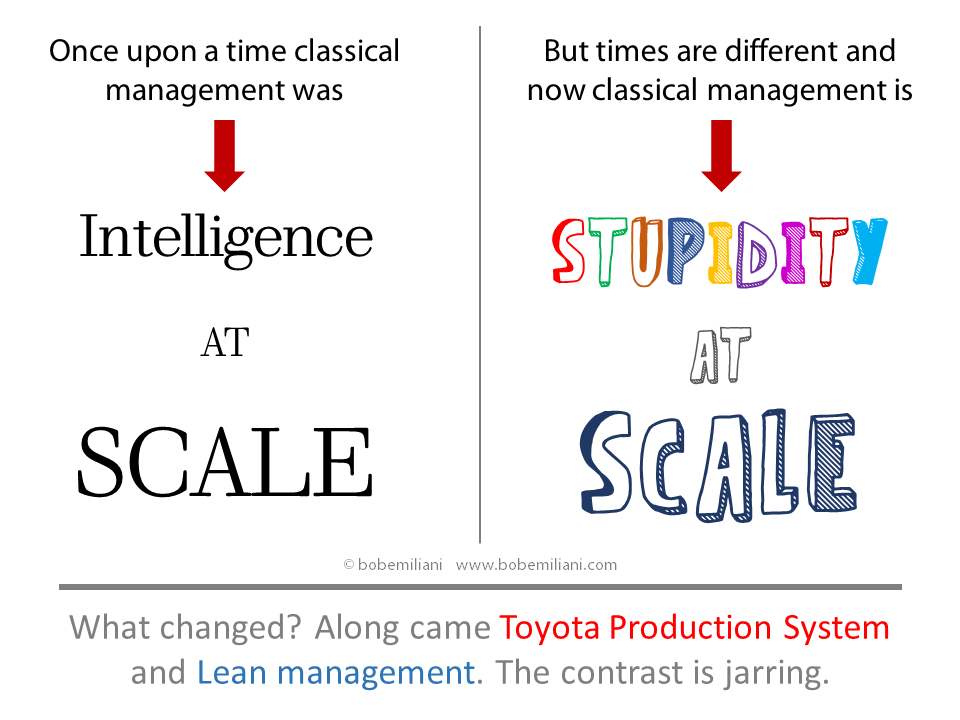In my graduate-level Lean leadership course, I introduce students to eight categories of preconceptions that are deeply intertwined with one another with respect to classical leadership and management practice. I then ask following question:
How do you know when economic, social, political, historical, philosophical, business, legal, or spiritual preconceptions are out of date and no longer useful?
Student teams identified the following 10 items:
- Incompatibility with the new
- Change in customer preferences / demand
- Repetitive problems
- Competitors doing better than you
- Reduced profit (decline in value of product or service)
- Does not promote new technology
- Experiencing bad outcomes (sales, cost, delivery, quality, etc.)
- Make bad decisions
- Stagnation
- Passive leadership
Let’s examine these one-by-one:
- Incompatibility with the new. It takes only small amount of experience with Toyota-style kaizen to know that the Toyota Way (and Lean) — the new — is incompatible with the old classical management.
- Change in customer preferences / demand. When markets shift from sellers’ to buyer’s, so too must the management system shift from classical to progressive (TPS or Lean).
- Repetitive problems. Classical management and associated leadership routines are well known to suffer from repetitive problems, due in part to archaic preconceptions including a preference for “Band-Aid” fixes over root cause analysis.
- Competitors doing better than you. Any organization that practices Toyota-style management or Lean management does better than competitors over a range of business performance metrics for almost any period of time.
- Reduced profit (decline in value of product or service). Classical management, being status quo oriented and thus slower to respond to change, is more likely to suffer from lower profit, higher variability in financial performance, or both.
- Does not promote new technology. If you consider progressive management as a new technology, which you should (see Improvement: A Hundred-Year Plan for Progressive Management, Chapters 2 and 3), then yes, leaders skilled in classical management do not promote new technology. In terms of machines, classically managed businesses are indeed highly technology-driven — but to a fault. Their injudicious use of technology to replace labor, and their shocking susceptibility to sales pitches, increases costs and reduces flexibility.
- Experiencing bad outcomes (sales, cost, delivery, quality, etc.). Various types of expensive corporate failures are more common among classically managed businesses than progressively managed businesses.
- Make bad decisions. The leaders of classically managed businesses are bound by preconceptions, cognitive biases, and various forms of illogical thinking that guarantee poor decision-making at a rate higher than progressively managed businesses.
- Stagnation. Being status quo oriented, classically managed businesses are sure to stagnate more than progressively managed businesses.
- Passive leadership. Being status quo oriented, classically businesses managed are sure to have more passive, less action-oriented leadership than progressively managed businesses.
By this analysis, it should be clear, in whole or part, that classical leadership and management practice is out of date. In fact, it has been out of date since at least the 1950s. What for a long time was a pinnacle of intelligence applied to the scale of millions of businesses has been reduced to stupidity at scale through ongoing ignorance of, or resistance to, better leadership and management methods.

Is classical leadership and management still useful? Indeed it is, because those skilled in its practice refuse to give it up. They have long been successful at defending the status quo. A social learning process among business leaders trains them well in both mindset and talking points, which few people critically assess, and so they remain highly persuasive. In addition, society defers to those who are superior in status and wealth, under the assumption that they must know better. We must use our individual and collective intelligence and question that assumption.
Long-standing deference to business leaders grants them permission to largely avoid recognizing the current and future needs of society and continue to benefit at others’ expense. Are you okay with that? Please think of progressive management in the larger context of what it can for society and not just for business. Start by questioning your assumptions — what you think is true but do not actually know to be true.
